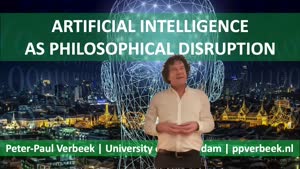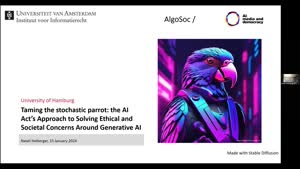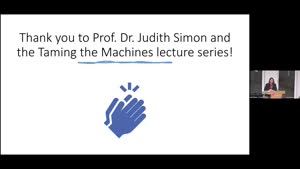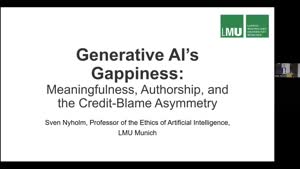Algorithmic Monoculture and the Ethics of Systemic Exclusion - Prof. Dr. Kathleen A. Creel - University of Hamburg
- Lecture2Go
- Catalog
- Sonstige Einrichtungen der UHH
- Öffentliche Vorlesungen
- Taming the Machines - The Philosophy, Ethics and Politics of AI
Catalog
1304 Views
28.11.2023
Algorithmic Monoculture and the Ethics of Systemic Exclusion
About the lecture
As the number of job applications increase, hiring managers have turned to artificial intelligence (AI) to help them make decisions faster, and perhaps better. Where once each manager did their own first rough cut of files, now third party software algorithms sort applications for many firms. Human mistakes are inevitable, but fortunately heterogenous. Not so with machine decision-making. Relying on the same AI systems means that each firm makes the same mistakes and suffering from the same biases. When the same person re-encounters the same model again and again, or models trained on the same dataset, she might be wrongly rejected again and again. In this talk, I will argue that it is wrong to allow the quirks of an algorithmic system to consistently exclude a small number of people from consequential opportunities, and I will suggest solutions that can help ameliorate the harm to individuals.
About the speaker
Kathleen Creel is an Assistant Professor at Northeastern University, cross appointed between the Department of Philosophy and Religion and Khoury College of Computer Sciences. Her research explores the moral, political, and epistemic implications of machine learning as it is used in non-state automated decision making and in science. She co-leads Northeastern’s AI and Data Ethics Training Program and is a winner of the International Association of Computing and Philosophy’s 2023 Herbert Simon Award.
---
This semesters edition of Taming the Machines explores the interrelated ethical, political, and technological aspects of Artificial Intelligence (AI) in an interdisciplinary way. AI-driven technologies are increasingly shaping the world we live in, sparking growing ethical scrutiny. As a result, it appears more and more urgent that societies collectively address how and in what way the further development of such technologies might be tangibly influenced. And, importantly, by whom this task should be advanced and according to which agendas? Ethicists, legislators, designers, and engineers, each bring distinct expertise and capacities to the multiplicity of social issues raised by these technologies, yet the perspectives and approaches they offer may or may not be complimentary or even simultaneously realisable (let alone mutually satisfactory). Amidst the rising tensions surrounding the AI driven transformation of our shared social space, particularly in the domain of governance and regulation, this lecture series asks how we might best accompany innovation in AI and realise ethically desirable future outcomes. In other words, to delve into the questions of what it means to live well in a society that is increasingly driven by AI tools? What design and regulative choices ought we make? What social infrastructures and normative frameworks might be needed for the future handling of emerging technologies? How could or should openness to innovation be reconciled with defending and developing the ideals of a free and democratic society under the rule of law? To explore these and other related questions, this public lecture series invites distinguished researchers from computer science, philosophy, and political theory to present and discuss their work. To get the latest updates and details how to attend the lectures, please visit http://uhh.de/inf-eit.
---
This semesters edition of Taming the Machines explores the interrelated ethical, political, and technological aspects of Artificial Intelligence (AI) in an interdisciplinary way. AI-driven technologies are increasingly shaping the world we live in, sparking growing ethical scrutiny. As a result, it appears more and more urgent that societies collectively address how and in what way the further development of such technologies might be tangibly influenced. And, importantly, by whom this task should be advanced and according to which agendas? Ethicists, legislators, designers, and engineers, each bring distinct expertise and capacities to the multiplicity of social issues raised by these technologies, yet the perspectives and approaches they offer may or may not be complimentary or even simultaneously realisable (let alone mutually satisfactory). Amidst the rising tensions surrounding the AI driven transformation of our shared social space, particularly in the domain of governance and regulation, this lecture series asks how we might best accompany innovation in AI and realise ethically desirable future outcomes. In other words, to delve into the questions of what it means to live well in a society that is increasingly driven by AI tools? What design and regulative choices ought we make? What social infrastructures and normative frameworks might be needed for the future handling of emerging technologies? How could or should openness to innovation be reconciled with defending and developing the ideals of a free and democratic society under the rule of law? To explore these and other related questions, this public lecture series invites distinguished researchers from computer science, philosophy, and political theory to present and discuss their work. To get the latest updates and details how to attend the lectures, please visit http://uhh.de/inf-eit.
Technical support
Please click on the link bellow and then fill out the required fields to contact our Support Team!
RRZ Support Link




